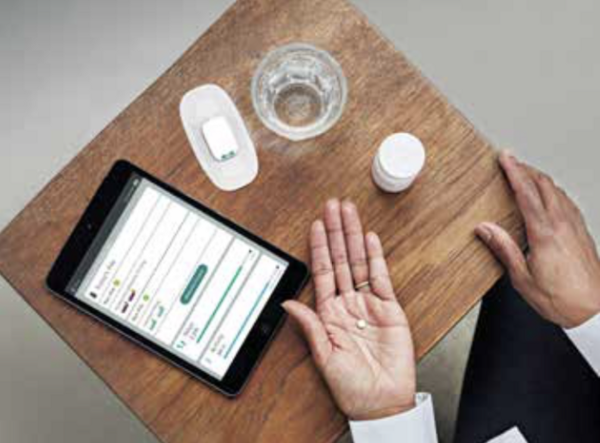For the first time cancer patients are using digital oncology medicines that allow doctors to track — at a distance and in real time — when they take their medicine and how their body reacts. The system — which was introduced in January and involves ingestible sensors packed into pills- captures, records and shares information about the time, dose and type of oral chemotherapy medication taken. This information, as well as data on rest, activity and resting heart rate, can be shared with the patient’s consent with their physician, pharmacist or caretaker. Privacy, a top concern for patients, is an important component. The system, developed by ProteusDigital Health, a World Economic Forum Technology Pioneer, is designed so that information can only be seen by the patient and individuals they designate on a secure, mobile-friendly platform. Proteus developed the care model for oral digital oncology medicines with two U.S. partners: University of Minnesota Health and Minneapolis-based Fairview Health Services, a non-profit organization.
Proteus Digital Health is a pioneer in a new category of pharmaceuticals known as digital medicines. Proteus’s pills work like this: widely used drugs are formulated so that they communicate when they have been ingested, a wearable patch detects medicines and captures physiologic responses, and mobile applications support patient self-care and physician decision- making. The company has more than 540 patents and regulatory clearances in the U.S., European Union and China. Its latest product is being billed as the first health system in the world to prescribe digital capecitabine, a common chemotherapy drug equipped with the Proteus ingestible sensor. It is currently being used to help treat stage 3 and 4 colorectal cancer patients. “We believe this will enable oncology patients to stay on their therapy longer, avoid hospital admissions, and have better response to therapy overall,” says Andrew Thompson, Proteus’ CEO and co-founder.
Digital Feedback
Already, the system is creating feedback for doctors that goes far beyond the digital data communicated. Doctors were astonished, for example,when they discovered via digital data that one cancer patient faithfully took her medicine every day except on Tuesdays and Wednesdays, recounts Thompson. When they asked her why they discovered that her daughter went to work on those days and the woman, who is additionally coping with multiple sclerosis, was unable to open the pill bottle on her own. After checking that there were no children in the house the doctors made sure she was given a pill container that was easier to open.
“Oncologists are engaged in patients’ lives due to the critical nature of the disease but even if there is a strong bond and they see the patient every week in a clinic it is impossible to know what is going on at home,” saysOlivia Ware, Proteus’ new senior vice president of US Markets and Franchise Development. “Patients do their best to remember what happened in the week since they last saw their doctor but it is really challenging because they are dealing with life threatening diseases and sometimes complex family and financial issues. It is hard to keep track of everything and remember to tell the doctor what is significant or even to know what is significant.”Being able to better understand patients’ behavior and how they respond to drugs is appealing to oncologists, says Thompson. Results with digital medicines for other diseases prove it can lead to better therapeutic outcomes, he says. Take the case of one set of cardiovascular patients who had been taking medicine for at least six months for high blood pressure but were not responding well to treatment. Thompson says that when these patients started taking digital medicine 98% had a good response rate within 90 days. “That’s an incredible outcome for patients failing drug therapy,” he says. “What person would not want premium health care for a loved one or themselves? This is one of the most compelling apps for mobile health.”







